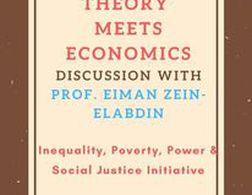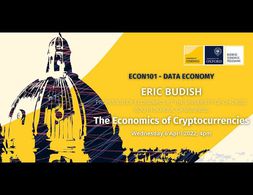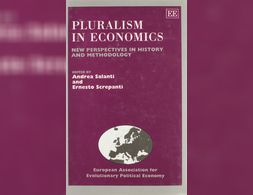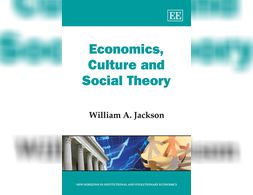✕
613 results
This film looks at the role economic growth has had in bringing about this crisis, and explores alternatives to it, offering a vision of hope for the future and a better life for all within planetary boundaries.
The postcolonial critique of Economics is one of the sharpest and most comprehensive indictments of the discipline highlighting the discipline s limited treatment of power and culture and the incompatibility of the discipline s theoretical frameworks and predictions with the contexts of most formerly colonised territories This interview of Prof …
In this article, Tetteh Hormeku-Ajei and Camden Goetz discuss the ongoing impacts of colonialism on Africa’s natural resources.
After completing the workshop in Post Keynesian Economics participants should be able to describe the main differences and similarities between PKE and other schools of thought.
This episode from Odd Lost podcast with financial analyst Zoltan Pozsar features a discussion on the potential long-term financial effects of the Ukraine-Crisis on dollar and the global currency system centered around it.
Drawing on Gramsci s Marxist Political Economy Mike Davis situates the War in Ukraine within the general condition of a crisis of capitalist hegemony The key argument is that the pathological and violent situation that we are finding ourselves in today is an expression of the inability of both global …
The lecturer focuses on his own paper The Economic Limits of Bitcoin and Anonymous Decentralized Trust on the Blockchain analysing the innovation of cryptocurrencies particularly bitcoin and its economic credibility The innovator of cryptocurrency Satoshi Nakamoto incorporated an interesting combination of computer sciences and economics The paper argues the limitations …
Asset Management firms control large parts of the global economy Just the three American asset management firms BlackRock Vanguard and State Street manage more than half of the combined value of all shares for companies in the S P 500 Their combined managed assets amount to 22 trillion May 2022 …
In this teaching pack, we look at the acquisition of Twitter by Elon Musk. In particular, we focus on what it means to take a company private and how the deal was financed.
Why is money more valuable than the paper on which it is printed Monetarists link the value of money to its supply and demand believing the latter depends on the total value of the commodities it circulates According to Prabhat Patnaik this logic is flawed In his view in any …
The Routledge Handbook of Heterodox Economics presents a comprehensive overview of the latest work on economic theory and policy from a 'pluralistic' heterodox perspective.
Contributions throughout the Handbook explore different theoretical perspectives including: Marxian-radical political economics; Post Keynesian-Sraffian economics; institutionalist-evolutionary economics; feminist economics; social economics.
This is a revolutionary and powerfully argued feminist analysis of modern economics, revealing how woman's housework, caring of the young, sick and the old is automatically excluded from value in economic theory. An example of this pervasive and powerful process is the United Nations System of National Accounts which is used for wars and determining the balance of payments and loan requirements.
The Wealth of Ideas traces the history of economic thought, from its prehistory (the Bible, Classical antiquity) to the present day.
Gender, Development, and Globalization is the leading primer on global feminist economics and development. Lourdes Benería, a pioneer in the field of feminist economics, is joined in this second edition by Gunseli Berik and Maria Floro to update the text to reflect the major theoretical, empirical, and methodological contributions and global developments in the last decade.
The Microeconomics of Complex Economies uses game theory, modeling approaches, formal techniques, and computer simulations to teach useful, accessible approaches to real modern economies.
Beyond Neoclassical Economics is a remarkable new introduction to the main heterodox schools of economic thought which examines their main concepts and their critiques of mainstream theory.
What do modern academic economists do? What currently is mainstream economics? What is neoclassical economics? And how about heterodox economics? How do the central concerns of modern economists, whatever their associations or allegiances, relate to those traditionally taken up in the discipline?
More Heat Than Light is a history of how physics has drawn some inspiration from economics and also how economics has sought to emulate physics, especially with regard to the theory of value. It traces the development of the energy concept in Western physics and its subsequent effect upon the invention and promulgation of neoclassical economics.
Contributors attempt to reconcile two major strands of thinking in economic methodology: the rhetoric of economics as advocated by Deirdre McCloskey, and the sociological approach.
Immanuel Wallerstein provides a concise and accessible introduction to the comprehensive approach that he pioneered thirty years ago to understanding the history and development of the modern world.
The age of the contemplative economist-scholar—at home equally in classical languages, economic history, the history of ideas, and mathematical theory—has passed. The history of economics as a subdiscipline has lost touch with the mainstream study of economics. InThe Future of the History of Economics, internationally known scholars from ten countries provide a comparative assessment of the subdiscipline.
This lively introduction to heterodox economics provides a balanced critique of the standard introductory macroeconomic curriculum. In clear and accessible prose, it explains many of the key principles that underlie a variety of alternative theoretical perspectives (including institutionalist economics, radical economics, Post Keynesian economics, feminist economics, ecological economics, Marxist economics, social economics, and socioeconomics).
Until the end of the early 1970s, from a history of economic thought perspective, the mainstream in economics was pluralist, but once neoclassical economics became totally dominant it claimed the mainstream as its own. Since then, alternative views and schools of economics increasingly became minorities in the discipline and were considered 'heterodox'.
In a changing world that has been shaken by economic, social, financial, and ecological crises, it becomes increasingly clear that new approaches to economics are needed for both theoretical and empirical research; for applied economics as well as policy advice.
Economics, Culture and Social Theory examines how culture has been neglected in economic theorising and considers how economics could benefit by incorporating ideas from social and cultural theory.
Despite some diversification modern economics still attracts a great deal of criticism. This is largely due to highly unrealistic assumptions underpinning economic theory, explanatory failure, poor policy framing, and a dubious focus on prediction. Many argue that flaws continue to owe much of their shortcomings to neoclassical economics.
Microeconomics: A Critical Companion offers students a clear and concise exposition of mainstream microeconomics from a heterodox perspective.
Planetary Mine rethinks the politics and territoriality of resource extraction, especially as the mining industry becomes reorganized in the form of logistical networks, and East Asian economies emerge as the new pivot of the capitalist world-system.
Over the last decade, the world's largest corporations - from The Coca Cola Company to Amazon, Apple to Unilever - have taken up the cause of combatting modern slavery. Yet, by most measures, across many sectors and regions, severe labour exploitation continues to soar. Corporate social responsibility is not working. Why?
Thomas Piketty's Capital in the Twenty-First Century is the most widely discussed work of economics in recent history, selling millions of copies in dozens of languages. But are its analyses of inequality and economic growth on target? Where should researchers go from here in exploring the ideas Piketty pushed to the forefront of global conversation? A cast of economists and other social scientists tackle these questions in dialogue with Piketty, in what is sure to be a much-debated book in its own right.
Macroeconomics in Context: A European Perspective lays out the principles of macroeconomics in a manner that is thorough, up to date, and relevant to students. With a clear presentation of economic theory throughout, this latest addition to the bestselling "In Context" set of textbooks is written with a specific focus on European data, institutions, and historical events, offering engaging treatment of high-interest topics, including sustainability, Brexit, the euro crisis, and rising inequality. Policy issues are presented in context (historical, institutional, social, political, and ethical), and always with reference to human well-being.
This groundbreaking collection explores the profound power of Social Reproduction Theory to deepen our understanding of everyday life under capitalism. It tackles issues such as child care, health care, education, family life and the roles of gender, race and sexuality, and shows how they are central to understanding the relationship between economic exploitation and social oppression.
Including contributions by: Lise Vogel, Nancy Fraser, David McNally and Susan Ferguson.
We use cookies on our website. Click on Accept to help us to make Exploring Economics constantly better!































